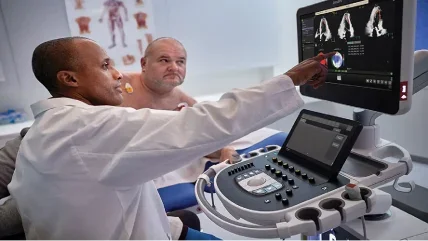
Royal Philips has introduced its new-generation AI-enabled cardiovascular ultrasound platform to speed up cardiac ultrasound analysis and reduce the burden on echocardiography labs.
The new AI applications are trained on anonymous patient data sets from real-life clinical environments and were approved by the US Food and Drug Administration (FDA).
They will be integrated into the company’s EPIQ CVx and Affiniti CVx ultrasound systems.
The new platform will significantly advance its cardiovascular imaging and diagnosis solutions, automating measurements and speeding workflows, said the Dutch health technology company.
Philips global cardiovascular ultrasound VP and business leader David Handler said: “By harnessing the power of AI into our echocardiography solutions, we empower clinicians with enhanced diagnostic capabilities, to ultimately improve patient care and outcomes in the management of coronary and valvular disease, while enhancing overall efficiency in cardiac practice.
“For patients, this means consistent image interpretation which can lead to fewer re-scans, shorter and more effective interventional procedures, and potentially faster recovery times.”
Philips said that the new AI features will be integrated across its cardiovascular ultrasound systems to improve the quality and reproducibility of cardiac imaging.
DiA Imaging Analysis, a medical technology company acquired by Philips in May last year, will provide the new FDA-approved and CE-marked software solutions.
The new AI applications will automate how users interpret ultrasound images, and help clinicians automatically analyse images with speed, efficiency, and accuracy in real-time.
In addition, Philips’ new mini ultrasound transducer X11 4t, introduced earlier this year, is fully compatible with the EPIQ CVx and Affiniti CVx systems.
The transducer enables interventional cardiologists to provide enhanced care to a wider range of patients, including paediatric patients as small as 5kg in weight.
Philips said that through breakthrough innovation and collaborations with technology companies such as NVIDIA, it will rapidly integrate AI into its cardiovascular ultrasound portfolio.
University of Chicago Medicine non-invasive cardiac imaging lab director Roberto Lang said: “As clinical cases get more complex and patient volumes increase, we read hundreds of echocardiography exams daily with thousands of data points.
“With the integration of AI into echocardiography solutions, we can now automate some of the steps to support clinicians’ decision-making, allowing them to detect, diagnose, and monitor various cardiac conditions with greater confidence and efficiency in seconds.
“An advantage of AI methods over conventional visual analysis is that it can be performed in seconds, providing rapid and accurate information to help augment expert reads by quickly highlighting areas of concern for RWMA, improving the ease and efficiency of interpretation.”






